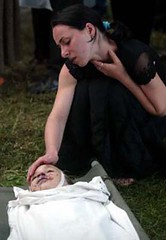Life

Today, my wife and I walked down to the courthouse in our little town with our baby daughter to finalize her adoption. She's been with us since she was born eight months ago. We waited patiently outside the courtroom with other adoption cases - one from Russia, another from China - one-by-one, families were invited through the imposing wooden doors that led to the courtroom. Our turn came, and we were led through the courtroom into the judge's chamber. We signed papers. The judge gave our daughter a stuffed animal. Photo-op, best wishes, and congratulations. Our long journey to find our daughter finally came to an end.
I have caught myself staring at the photo, shown here, over the past few days. It's of an unknown mother in Beslan, Ossetia, caressing her dead child's face in the wake of the school massacre by Islamic extremists last September. More than once, I thought of her today at the courthouse. My newfound fatherhood has magnified my sensitivities to horrors like this mother losing her child. And even worse - not merely losing her child to the grisly lottery of disease or random mishap - but to black, deliberate murder. I wonder if the Beslan mother can take comfort from another human being. I wonder if she has hardened her heart into stone: since humanity can be so callous, so cruel, and so pernicious, perhaps then no human can be trusted ever again. Not even for solace.
Our day was the antithesis of the photograph I show here. I can tell you that adoption is probably one of the most deliberate things you can do in life. It is no accident. It is a long process, of many trials. The process itself mirrors life, with its eddies and currents, misfortunes and luck. Adoption is like driving a car with foggy windows; you keep driving, and the gas pedal moves you forward. There's surprises along the way, and eventually you get somewhere.
I can let myself be weighed down by the world at times, perplexed at how best to ford its dangerous currents. Adoption is a weighty endeavor; but with the responsibility of parenthood comes a giddy sense of optimism when my new daughter's little eyes meet mine. It's as though she says not to worry, while also asking me to keep her safe. It's not obvious how to balance the sense of graveness and punch-drunkenness that comes with this little girl who pulls my nose.
'The Mother of Beslan' is a symbol of our time. This single photo is the equivalent of Michelangelo's Pietà for the 21st century. I can only try to feel this mother's butchered love screaming out for her lifeless child that she strokes so gently. Her pain blinds me. I cannot imagine her pain. We see in the photo the moment when a mother realizes her child is lost, and forever gone. We see two deaths, not one.
Beslan and massacres like it are often called tragedies. But they are not. Tragedy, in my mind, is a natural occurrence, a twist of fate. It is a tragedy when an illness kills a child, or when an earthquake destroys lives. Tragedies are sad, but there is no evil behind them - there is no moral component. The planned massacre of children in the name of a vindictive, bloodthirsty and sanguinary god is not a tragedy; it is a monstrous, sickening evil. It is a liquid, black ink that bleeds out of twisted souls who have lost their own humanity. The Beslans of this world are far, far beyond mere tragedy. Slaughtering human lambs on the altar of an insane cult is our darkest, most mortal foe.
If I were to nominate a person of the year, it would be this grieving mother who so moves me. She is a symbol of the darkness of this age we live in. Inhumanity's wages create a carnage of living dead as much as the lifeless bodies of children. Weep for her.
And yet, this age is not all darkness. My daughter sparkles, and toys with gravity. She's the long, hopeful road ahead. Extricated from the clutches of her own personal tragedy - born to a birth mother who could not love her - the miracles of this age collaborated to bring her to our home. The world is not all Beslan; there is hope and joy. It is bright, clear, and warm.
